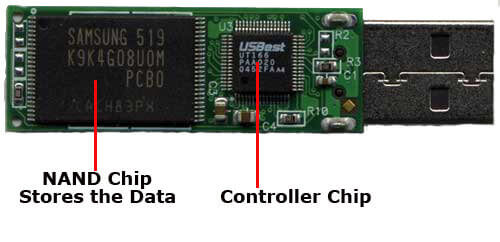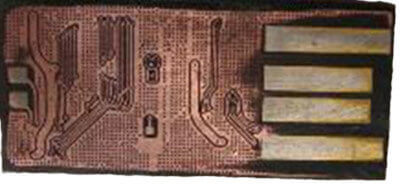Flash Drive Data Recovery Specialists
Flash Drive Technology Basics
Flash drives fall into two main categories: NAND and Monolithic
NAND flash drives contain two major components. The NAND chip (that holds the data) and the controller chip shown in the picture below. The controller chip controls how and where the data is stored on the NAND chip. We have the technology and training to remove the NAND chip or chips (if necessary) to bypass all other electronics that could be broken or failed in order to gain direct access to the RAW data on the NAND chip. This is still a problem because the controller uses special algorithms to write the data to the NAND Chip. This means the RAW data on the NAND chip is scrambled and/or encrypted using XOR algorithms or other complicated algorithms. Each controller and NAND chip has to be reverse engineered to discover how we can successfully gain access to the data and provide our customers all their original file structure and working data. The process is extremely complicated and time consuming.
This process (called chip off work) is necessary in many cases where the flash drive is no longer recognized by your computer or is recognizing as the incorrect size.

Monolithic flash drive technology is the newest flash technology on the market and is becoming more popular all the time. Monolithic flash drives are a single chip design molded in solid plastic. Monolithic flash drives do contain a data chip area and a controller area (all one chip). This design has created many problems for the data recovery industry because of the molded plastic that encases the flash drive electronics and the complicated structure of the device. The picture below shows the flash drive with the plastic carefully scraped away to reveal the electrical track that we use to gain direct access to the data of a failed monolithic flash drive.
Once the plastic is removed, we have to discover the pin-out (specific parts we need to solder to) in order to bypass the controller and gain direct access to the data. There are hundreds of different versions of these and different pin-outs for each one. The pin-out is extremely complicated to discover. We then have to solder 16 very tiny wires directly to the specific areas of the drive that connect to an adapter. If we have completed this process successfully, we are then able to read in the RAW image dump to our machines. Finally, we have to reverse engineer the way the controller writes the data to the device so we can de-scramble / decrypt it. If we do this successfully, we are able to provide you with a successful recovery of your data.

Why Choose File Savers for your flash drive data recovery?
Because you can't afford to lose your data! Often times data recovery is a one shot chance. If you send your flash drive to the wrong company, you may never see your data again.
We won't give up until we have exhausted every possible solution to recover your files. We are confident that if we can't recover them, no one can.
We have all the latest flash data recovery tools and technology plus our own proprietary data recovery technology, tools and methods to recover files from flash drives most companies can't.
Our customer service is second to none. We keep you updated throughout the recovery process so you know what's going on from beginning to end.
National data recovery leaders because of our research and development team, we gain experience faster than our competition and recover drives that others would call unrecoverable.
We are HIPPA & PCI compliant: security and privacy is vital when dealing with important or regulated data. We keep all of your data stored off line in our secure vault and your information and data is always kept private.
Flash drives are versatile and portable making them perfect for transferring data from one computer to another or simply making quick backups of your files. Flash drives are cool little data storage devices but they are prone to failure or physical damage because of their portable nature.
We recover flash drives that have been bent, broken, smashed, chewed, water damaged, electrically damaged and flash drives that simply fail all by themselves from age or usage. We also recover flash drives that have been formatted, deleted, not recognized, recognized as incorrect size, asking to be formatted and more.
Types of Flash Drive Failures
Logical Flash Drive Failure:
Flash drives are susceptible to logical failures because they often get connected and disconnected to your computer or several computers. Sometimes, disconnecting a flash drive without properly ejecting it can cause damage to the boot sector, partition, or file system. If your external hard drive is suddenly asking to be formatted and your confident your drive is not physically damaged, you have a few options.
. Attempt Recover Yourself: Go to our Do it Yourself Data Recovery Page
Remote Recovery by File Savers: Go to our Remote Data Recovery Page.
In Lab Recovery by File Savers: Go to our In Lab Data Recovery Page.
Physical Flash Drive Failure:
If your flash drive is no longer recognized by your computer, there is a high chance your it's suffering from a physical failure. The most common physical flash drive failures we see are caused by bending, breaking, smashing or dropping them.
Physical flash drive failures can also include electrical failures or random chip failures from age, abuse or extreme use. If your flash drive is not recognized or recognized as the wrong size, we highly recommend that you disconnect it and give us a call for a Free Diagnosis today.
We understand that it's really easy to accidentally make a mistake and delete files or format your flash drive. Deleted data or a formatted flash drives can be recovered depending on what you have done since the initial mistake. If you turned off your flash drive immediately, we can probably recover all of your files. However, if you continued using your flash drive and copied or wrote any data to the drive you can make your deleted or formated data unrecoverable. Once the deleted data becomes overwritten, it becomes impossible to recover.
If you accidentally deleted important data or formatted your flash drive we highly recommend you power off your drive and do not continue using it until we successfully recover your files.
Most flash drives are formated Fat 32 so they work with Mac and Windows systems but if you have formatted your flash drive specifically for the machine that you use for better performance we can still recover it.
| Flash Drive Types | Operating Systems | File Systems |
USB 2.0 |
Windows Mac Linux |
Fat 32 ExFat HFS HFS+ NTFS EXT EXT2 EXT3 XFS |

